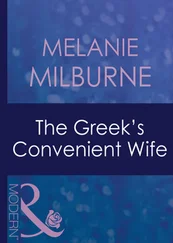“Anne, you’re hysterical.” Charles coughs, his entire body racked with the effort, and I hand him the water before the nurse stationed in the next room can hear. He sips, his Adam’s apple, so prominent now, sliding up and down, and when he waves his hand, I take the water away. “A man can still spread his seed, no matter his age. That’s all I did. I followed my instincts.”
“That’s such a typically male thing to say.”
“Are you telling me you were happy all those years? Are you telling me you never desired companionship when I was gone?”
Now he looks like the old Charles, the healthy, untouchable Charles; his gaze is clear and precise as it pierces right through me.
“I never wanted you to leave in the first place,” I reply truthfully, not flinching from his gaze, even as I ponder my own secret.
And wonder, for the first time, if he’s ever guessed it.
CHAPTER 18

IT’S THE QUIET THAT YOU NOTICE, first, when the children begin to leave.
And not just the practical fact that the record player is unplugged, the radio turned off. Not simply the lack of some instrument being practiced behind a closed door. Not merely the silent phone, the absence of stampeding feet up and down stairs, the slamming of doors, the constant rush of water in the bathroom.
It’s more than that—and less than that, too. It’s a hum, a vibration that leaves when they leave. For all of a sudden the very air in the house is slower, duller; gentler against your eardrum.
First Jon left, to go to Stanford in 1950. Dutiful as ever, he came home every vacation, anxious to see the wreckage his siblings had done in his absence and to put it right again. But he also married young, in 1954. He did not come home so much after that.
Land followed him west to Stanford two years later. Our last son, Scott, burst out of the house like a caged animal released; he started at Amherst in 1959, but it was soon apparent he was the one who would have to learn life’s lessons the hard way.
Scott rarely came home for the holidays, and I never even looked for him to. His teenage years had been typical—had his last name not been Lindbergh. But Charles simply could not understand the fluctuating grades, the late-night pranks, the minor brushes with authority. He could not understand the lack of focus, the inability to see past tomorrow. Whenever the two of them were together, it was explosive; the girls tiptoed about, trying not to get hit by the debris.
I, however, did not tiptoe.
“You can’t talk to him that way,” I shouted at Charles, my hands balled into fists, my heart wrecked with pain for my son, who had just been called a lazy idiot by his father. “Words like that can never be forgotten! He’ll carry that with him his entire life!”
Charles remained maddeningly calm. “Of course you’d defend him. He’s just like you. Your whole family, you Morrows—all so stubborn and perverse. Had I only known—”
“What? Known what?”
“The things you didn’t tell me when we were courting. Dwight and his problems. Elisabeth.”
“Elisabeth? What about Elisabeth?”
“Her weak heart. Her emotional state.”
“Because she felt? Because she loved? Oh, don’t make this about my family. We’re talking about your son.”
“It’s only that it’s no surprise to me he’s such a mess, given his genetic history. Still, I’m determined to make him into a real Lindbergh.”
“And what does that mean? Someone who has no feeling?”
“It means I have to be tough on him, just like my father was tough on me. You’re his mother, and you coddle him. Well, your work is done now. I’m his father.”
“Did your father toughen you up by making you feel worthless and, and—less? Was he that cruel, as cruel as you are? Tell me. I want to know, because you never tell me anything. You go off and leave me here to raise your children, and you tell me nothing about your life. I don’t know anything about your childhood. I don’t know what you did yesterday. I don’t know what you’re going to do tomorrow. I’m your wife—talk to me! We used to, don’t you remember? Don’t you remember talking over things, when you’d come home from working in the city with Carrel? Don’t you remember our conversations on our flights, how much we shared? What happened to that? I miss it, I miss it so much that—”
“You’re hysterical, Anne.” Still he remained unperturbed, giving outward evidence, once more, of his superiority; he actually picked up a magazine, settled into a chair, and began to read. As if I were simply an annoying fly, buzzing around his head.
I yanked the magazine out of his hands.
“No, I’m finally pushing back,” I hissed. “You told me to go find my voice—well, I did. I’m using it now, or can you not hear me, up on that pedestal of yours?”
He didn’t respond; we glared at each other for what seemed like the entire length of our marriage, right there—spreading, like a noxious stain, between us, pushing us farther and farther apart. Once, we’d shared the same tiny cockpit for days on end, and he didn’t mind. He’d made room for me, even though it meant he had to sit cramped, his long legs twisted and bent. He never once complained.
Now it seemed as if he had to keep entire continents between us. And I had no idea what had changed; I only knew I was the only one of us who seemed to care.
Charles finally rose from his chair, still deliberate, untouchable, and went outside to the garage, where I knew he would remain all night. Lately, when he was home, that’s where he spent most of his time, working on some engine or another—something orderly, mechanical, full of gadgets and gears and springs and not emotions; something he could understand.
I crumpled the magazine and threw it away, although I didn’t follow him. I nursed my hurt and honed it, just as I had as a child when my father called me “the disciplined one.” I carried my grievance about until I couldn’t even feel its weight; it felt as much a part of me as the old dirndl skirt I wore when I tramped about outside. I forgot what it was like to be near my husband and not seethe or grind my teeth, even as I couldn’t help but weep each time he left, wishing he’d ask me, just once, to come with him.
But I suffered the most for my children, especially Scott. He withdrew even from me; during family celebrations he was there, but he wasn’t, sitting, watching; brooding so, you could almost see the tension radiating from him in cartoonish waves.
When he left for school, I knew it would be a very long time before I saw him again. And I knew it was my fault, as well as Charles’s. Had I known more about my husband’s childhood—still cloaked in mystery, he never would tell me more than he had early in our marriage—would I have been able to protect my own children from his demons? Had I found my voice earlier, would I have been able to ask the right questions, speak up for them, too?
It was too late now. We were all shattered into pieces, pierced by that unflinching steel gaze that judged us all and found us lacking. I could only hope my children would one day be able to reassemble themselves, as I had only begun to do, into the people they wanted to be. And not the people he wanted them to be.
The girls were easier, although I despaired to see my own compliant nature so obvious in my daughters, especially Ansy.
She had wanted to go to Paris, to the Sorbonne, but Charles wouldn’t hear of it. So she made do at Radcliffe, pointedly, but sweetly, not choosing Smith. She struggled so much to separate herself from me, but it was never a violent wrenching. It was gentler, more persistent; like the endless slapping of waves against a rock, wearing it down over time.
Читать дальше













